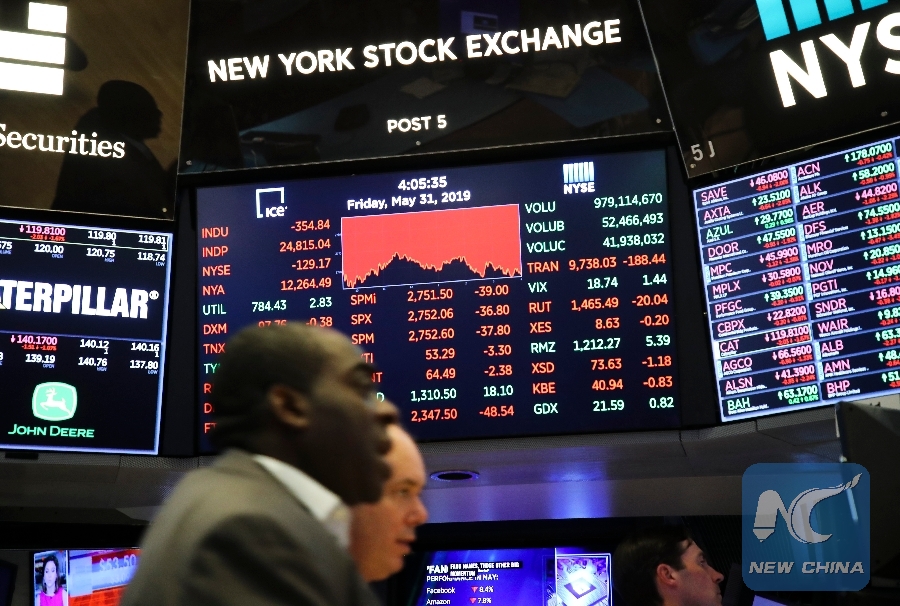
Electronic screens show trading information at the New York Stock Exchange in New York, the United States, on May 31, 2019. (Xinhua/Wang Ying)
by Matthew Rusling
WASHINGTON, May 31 (Xinhua) -- The past month was one of the worst months of May for trading in several years, with U.S. markets seeing wild swings as the United States stirred up trade disputes with China.
Despite a strong U.S. economy, experts warn that the trade tensions will continue to drag U.S. markets down.
This month saw U.S. President Donald Trump slap heavy tariffs on Chinese goods, with Beijing retaliating with tariffs of its own. That has caused much market turmoil in May.
The Dow Jones Industrial Average, the Nasdaq and the S&P 500 have lost at least 4 percent in the month of May.
In addition, to add to investors' woes, Friday saw the market tank 350 points on a surprise announcement from Trump that he would levy 5 percent tariffs, which could reach 25 percent, on goods from neighboring Mexico, as the president is frustrated with what he sees as Mexican inaction to stem the massive tide of illegal immigration from the U.S. Southern border.
As the trade tensions intensify, experts fret that the global economy may grind to a much more sluggish pace.
Some experts said markets have adjusted to the trade disputes, but trade tensions could also slow the global economy and that could indeed impact U.S. markets in a long run.
"I think investors have largely adjusted to the extension of the conflict. It is responsible for the recent decline, but the greater ongoing threat is the evidence of a slowing of the global economy," Brookings Institution Senior Fellow Barry Bosworth told Xinhua.
While much of the trade war has become "baked in" to U.S. markets, major shocks, such as announcements of new tariffs, could have an impact.
"Without another major shock, the market will level out. However, more evidence of an intensification appears on nearly a daily basis," Bosworth said.
In some cases, it seems investors are overreacting to bad headlines. For example, earlier this month saw tech stocks took a dive on their exposure to China. But at the same time, there are broader implications of the trade conflicts, some experts has said.
"The short-term reactions of investors are often overdone, but the concern is about the broad implications of an ongoing conflict, not just specific industries that are exposed to trade," Bosworth said.
In response to whether he foresees more months like May, Desmond Lachman, a resident fellow at the American Enterprise Institute, a Washington-based think tank, told Xinhua that "it very much depends on U.S. trade relations. If those continue to deteriorate we could have a long period of big market weakness."
Experts, economists and investors also said a mutually beneficial deal would be great for U.S. markets. A solid agreement could well add up to 3,000 points to the Dow, as some experts forecast.

